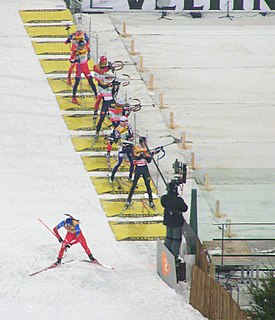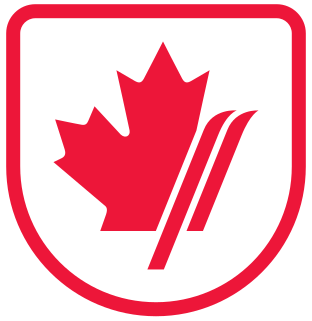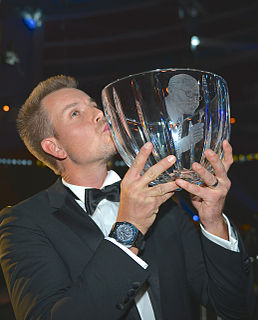
The biathlon is a winter sport that combines cross-country skiing and rifle shooting. It is treated as a race, with contestants skiing through a cross-country trail whose distance is divided into shooting rounds. The shooting rounds are not timed per se, but depending on the competition missed shots result in extra distance or time being added to the contestant's total.

Skiing is a means of transport using skis to glide on snow. Variations of purpose include basic transport, a recreational activity, or a competitive winter sport. Many types of competitive skiing events are recognized by the International Olympic Committee (IOC), and the International Ski Federation (FIS).

Winter sports or winter activities are competitive sports or non-competitive recreational activities which are played on snow or ice. Most are variations of skiing, ice skating and sledding. Traditionally, such games were only played in cold areas during winter, but artificial snow and artificial ice allow more flexibility. Artificial ice can be used to provide ice rinks for ice skating, ice hockey, and bandy in a milder climate.

The 1998 Winter Paralympics, the seventh Winter Paralympics, were held alongside the Winter Olympics in Nagano, Japan from 5 to 14 March 1998. They were the first Paralympic Winter Games to be held outside Europe. 571 athletes competed in Nagano; it still remains the highest number of athletes competing at any Winter Paralympics.

The 1988 Winter Paralympic Games were the fourth Winter Paralympics, held again in Innsbruck, Austria. These were the last Winter Paralympics to be held in a separate location from the Winter Olympics. Beginning in 1992, the Olympics and the Paralympics were held in the same city or in an adjacent city. These Paralympics were not held at the same Olympic venue in Calgary, Canada, because of financial and recruiting difficulties. A total of 377 athletes from 22 countries took part. The USSR competed for the first and only time. Sit-skiing was introduced as another event in both the Alpine and Nordic skiing competitions. Other sports were biathlon and ice sledge speed racing. Ice sledge speed racer Knut Lundstroem from Norway was the most successful athlete, winning four gold medals in the 100m, 500m, 1000m and 1500m events.
A European Championship is the top level international sports competition between European athletes or sports teams representing their respective countries or professional sports clubs.

Fana Idrettslag is the biggest multi-sport club in Fana, Bergen, Norway. It has several branches, of which football is the largest.

Alpine Canada is the national governing body for alpine ski racing, para-alpine and ski cross in Canada. Alpine Canada represents coaches, officials, supporters and athletes, including the racers of the Canadian Alpine Ski Team, Canadian Ski Cross Team and the Canadian Para-Alpine Ski Team. Alpine Canada is also involved in promoting participation within Canada's four million recreational skiers.
The Egebergs Ærespris is a prize awarded to Norwegian athletes who excel in more than one sport. The prize was created by Ferdinand Julian Egeberg, and consists of a bronze statuette modelled by sculptor Magnus Vigrestad.

Paralympic cross-country skiing is an adaptation of cross-country skiing for athletes with disabilities. Paralympic cross-country skiing is one of two Nordic skiing disciplines in the Winter Paralympic Games; the other is biathlon. Competition is governed by the International Paralympic Committee (IPC).

Finland first participated at the Olympic Games in 1908, and has sent athletes to compete in every Summer Olympic Games and every Winter Olympic Games since then. Finland was also the host nation for the 1952 Summer Olympics in Helsinki. Finnish athletes have won a total of 302 medals at the Summer Games, mostly in athletics and wrestling. Finland has also won 162 medals at the Winter Games, mostly in nordic skiing events.
World Cup commonly refers to the FIFA World Cup.

The Jerring Award is a prize established by Radiosporten, the sport section of Sveriges Radio, voted by its radio audience who choose the Swedish athlete or team that has made the best sport performance of the year. The prize is named after Swedish radio personality Sven Jerring. It is also called "the prize of the people", since it is the radio audience who vote. There has around 2010-2019 been criticism on the fact that there has been campaigns within sports with many amateurs, so that golf and horse jumping has been awarded.

Canada competed at the 1994 Winter Paralympics in Lillehammer, Norway from March 10 to 19, 1994. 34 athletes competed in all four sports: alpine skiing, ice sledge hockey, ice sledge speed racing, and Nordic skiing.

The sport of cross-country skiing encompasses a variety of formats for cross-country skiing races over courses of varying lengths according to rules sanctioned by the International Ski Federation and by various national organizations, such as the U.S. Ski and Snowboard Association (USSA) and Cross Country Ski Canada. International competitions include the FIS Nordic World Ski Championships, the FIS Cross-Country World Cup, and at the Winter Olympic Games. Such races occur over homologated, groomed courses designed to support classic (in-track) and freestyle events, where the skiers may employ skate skiing. It also encompasses cross-country ski marathon events, sanctioned by the Worldloppet Ski Federation, and cross-country ski orienteering events, sanctioned by the International Orienteering Federation. Related forms of competition are biathlon, where competitors race on cross-country skis and stop to shoot at targets with rifles, and paralympic cross-country skiing that allows athletes with disabilities to compete at cross-country skiing with adaptive equipment.
Joseph Peter "Joe Pete" Wilson was an American Olympic cross-country skier, who skied for the U.S. in cross-country at the 1960 Winter Olympics and later became a well-known skiing administrator in the United States. Wilson also in collaboration authored several books on cross-country skiing, all co-written by William J. Lederer. Wilson set up the cross-country ski area at the Trapp Family Lodge in Stowe, Vermont – the lodge established by the Trapp family of The Sound of Music fame. In 1973, Wilson organized a meeting of 25 ski areas and established the National Ski Touring Operators' Association. Wilson was named as its first President from 1973-1977. After several name changes it is now called the Cross Country Ski Areas Association (CCSAA). CCSAA is an international association of U.S. and Canadian cross-country ski areas. Wilson is also known for having set up an inn in Keene, New York, the Bark Eater Inn, and developing the ski trails around the inn.











